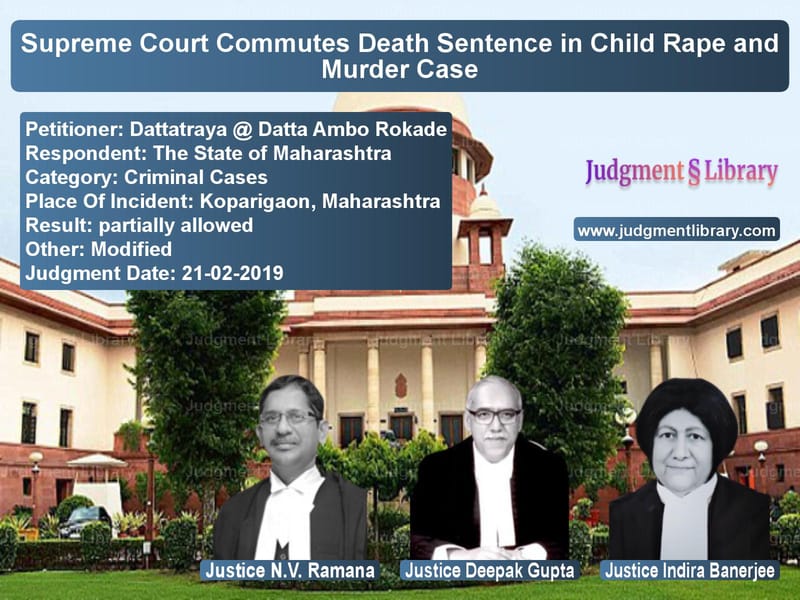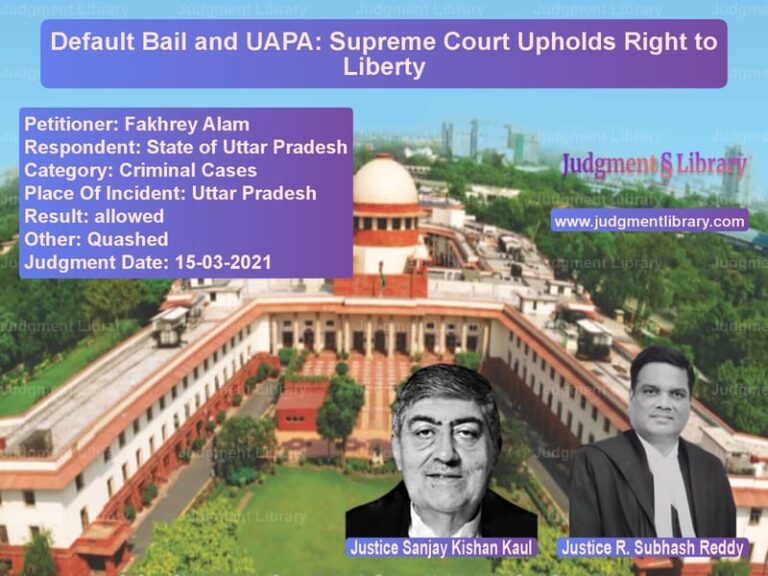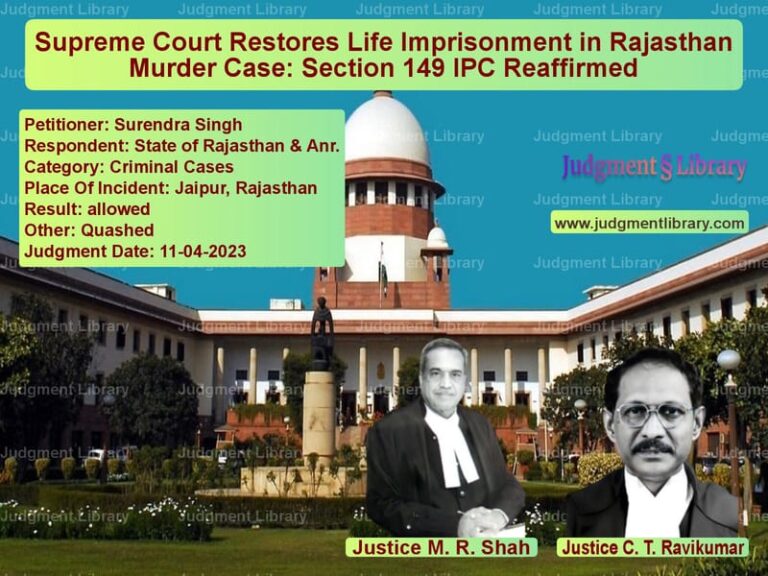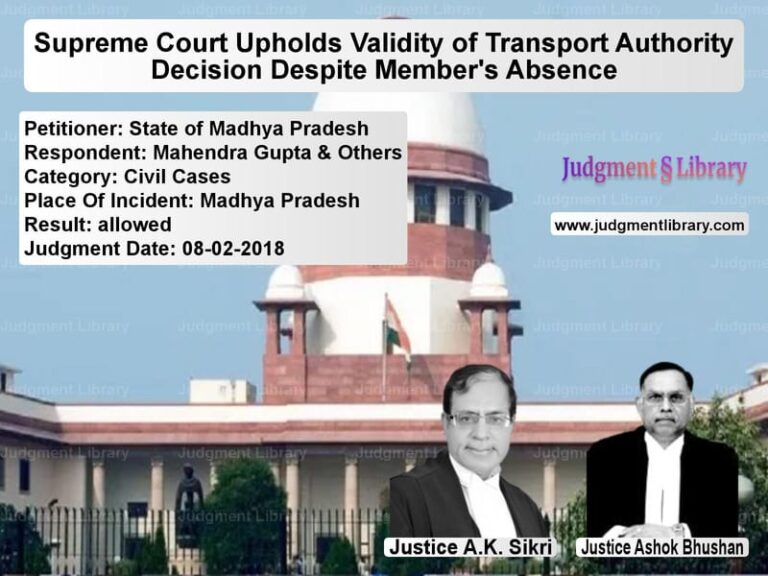Supreme Court Commutes Death Sentence in Child Rape and Murder Case
The case of Dattatraya @ Datta Ambo Rokade vs. The State of Maharashtra involved a horrific crime of child rape and murder. The Supreme Court was called upon to decide whether the death sentence awarded by the Trial Court and confirmed by the High Court should be upheld. The case raised crucial questions about the application of the ‘rarest of rare’ doctrine in awarding the death penalty.
Background of the Case
The appellant, Dattatraya Rokade, was convicted for the brutal rape and murder of a five-year-old girl in January 2013. The victim was the daughter of his neighbors. The prosecution alleged that the appellant took the child to his house, raped her, inflicted grievous injuries, and smothered her to death. The next morning, her nude body was found outside her home.
The post-mortem report confirmed sexual assault and asphyxiation as the cause of death. DNA evidence established that the semen found on the victim’s body and in the accused’s home matched that of the appellant. Based on this evidence, the Trial Court found him guilty and sentenced him to death, a decision later confirmed by the Bombay High Court.
Legal Issues Before the Supreme Court
The Supreme Court had to determine:
- Whether the conviction of the appellant was justified based on the evidence.
- Whether the crime fell under the ‘rarest of rare’ category warranting the death penalty.
- Whether the accused was given a fair opportunity to present mitigating factors before the sentencing.
Petitioner’s Arguments
The appellant’s counsel argued:
- There was no direct evidence linking the accused to the crime, and the conviction was based on circumstantial evidence.
- The accused was not given an adequate opportunity to present mitigating circumstances before the Trial Court imposed the death penalty.
- The appellant’s age, mental state, and possibility of reformation were not considered.
- The case did not meet the ‘rarest of rare’ standard required for a death sentence.
Respondent’s Arguments
The State of Maharashtra contended:
- The evidence, including DNA analysis, clearly established the guilt of the accused.
- The brutal nature of the crime, involving the rape and murder of a child, justified the death sentence.
- The accused had a history of sexual misconduct, further proving his criminal intent.
- The case fell within the ‘rarest of rare’ category, warranting capital punishment.
Supreme Court’s Observations
The Supreme Court upheld the conviction based on the forensic evidence, extra-judicial confession to his wife, and the testimony of witnesses. However, the Court analyzed whether the death penalty was justified.
“The crime is undoubtedly heinous, but the question is whether the accused has any possibility of reformation or rehabilitation.”
The Court considered various precedents, including Bachan Singh vs. State of Punjab, which emphasized that life imprisonment should be the rule and death penalty an exception. The Court noted that:
- The accused had no previous criminal record indicating a pattern of repeated offenses.
- There was no clear evidence of premeditation to commit murder.
- The Trial Court did not sufficiently explore mitigating circumstances before imposing the death penalty.
- The appellant had not been given a fair opportunity to present his case against capital punishment.
Final Judgment
The Supreme Court ruled:
- The conviction of the appellant under Sections 302, 376(2)(f), 377 of the IPC and relevant provisions of the POCSO Act was upheld.
- The death sentence was commuted to life imprisonment without the possibility of remission.
- The appellant would serve life imprisonment for the natural duration of his life.
- No remission or reduction of the sentence would be granted.
Conclusion
The judgment underscores the principle that the death penalty should be awarded only in the ‘rarest of rare’ cases. While acknowledging the brutality of the crime, the Court emphasized the need to consider mitigating factors and the possibility of reformation. The ruling serves as a crucial precedent in cases involving the death penalty, reinforcing the necessity of a balanced approach to justice.
Petitioner Name: Dattatraya @ Datta Ambo Rokade.Respondent Name: The State of Maharashtra.Judgment By: Justice N.V. Ramana, Justice Deepak Gupta, Justice Indira Banerjee.Place Of Incident: Koparigaon, Maharashtra.Judgment Date: 21-02-2019.
Don’t miss out on the full details! Download the complete judgment in PDF format below and gain valuable insights instantly!
Download Judgment: Dattatraya @ Datta A vs The State of Maharas Supreme Court of India Judgment Dated 21-02-2019.pdf
Direct Downlaod Judgment: Direct downlaod this Judgment
See all petitions in Murder Cases
See all petitions in Rape Cases
See all petitions in Bail and Anticipatory Bail
See all petitions in Judgment by N.V. Ramana
See all petitions in Judgment by Deepak Gupta
See all petitions in Judgment by Indira Banerjee
See all petitions in partially allowed
See all petitions in Modified
See all petitions in supreme court of India judgments February 2019
See all petitions in 2019 judgments
See all posts in Criminal Cases Category
See all allowed petitions in Criminal Cases Category
See all Dismissed petitions in Criminal Cases Category
See all partially allowed petitions in Criminal Cases Category







